Our Guidance
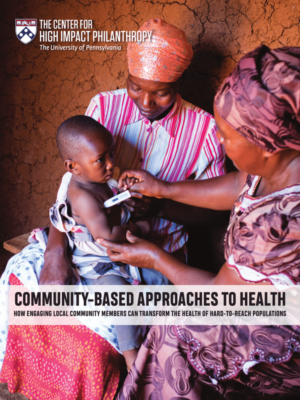
Community-Based Approaches to Health
From rural villages in Malawi to crowded urban slums in Bangladesh, community-based health organizations are delivering interventions to underserved communities around the world. These organizations engage local communities to understand their unique health needs, and use science-based methods to prevent and treat health problems. Their work has proven to accelerate better health outcomes in even the most challenging settings.
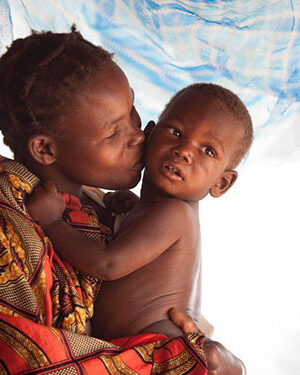
Improving Child Survival Rates
From rural villages in Malawi to crowded urban slums in Bangladesh, community-based health organizations are delivering interventions to underserved communities around the world. These organizations engage local communities to understand their unique health needs, and use science-based methods to prevent and treat health problems. Their work has proven to accelerate better health outcomes in even the most challenging settings.

Lifting the Burden of Malaria
Malaria kills more than 5,000 people a day, primarily children in sub-Saharan Africa. Recent analyses show that there is a window of opportunity for philanthropists to build on existing support for malaria prevention and treatment. The effects of rapid scale-up in malaria-affected regions make funding now substantially more cost-effective than a continuation of the current funding trajectory. Such investment today could save twice as many lives for every dollar spent.
FEATURED MEDIA
Just Economics Podcast
Co-hosts Ioana Marinescu, associate professor at the School of Social Policy and Practice at the University of Pennsylvania, and Kat Rosqueta, founding executive director of CHIP, talk about COVID-related job loss and the effects of unemployment insurance policies. Ioana interviews Eliza Forsythe, an economics professor at the University of Illinois Urbana-Champaign, about the labor market during COVID-19 and how the pandemic and the United States government’s response has impacted inequality in the U.S.
Our Framework & Applications
Below are five effective community-based approaches to health that donors can look for in organizations to fund.
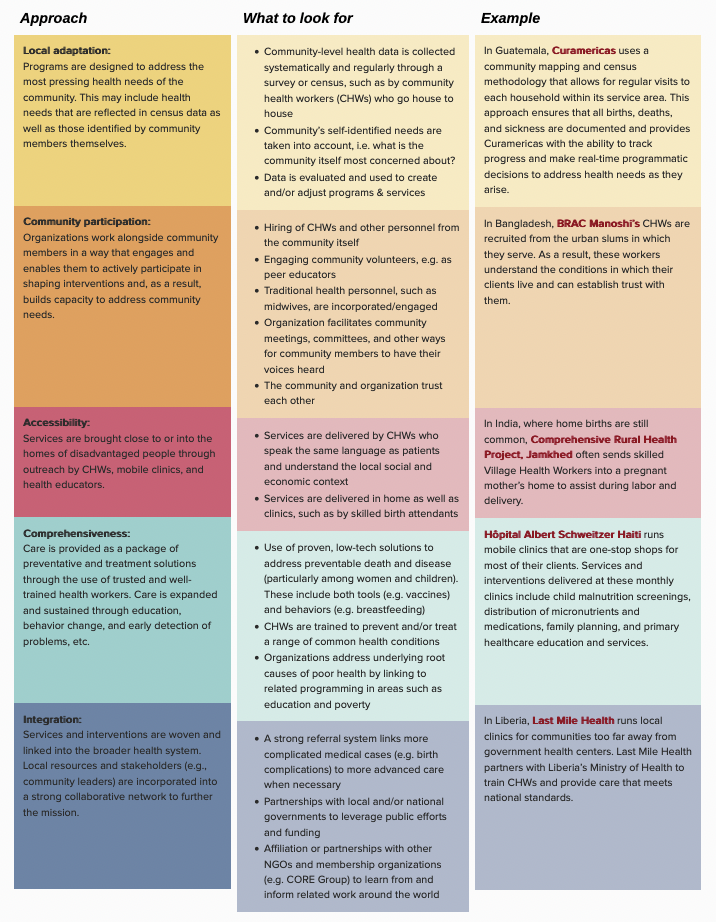
1. Treat and Prevent Now
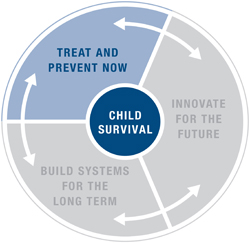
Increase access to life-saving prevention and treatment at the community level.
Effective and cost-efficient tools and approaches exist for the most common deadly conditions of childhood but they are not reaching many who need them most. Examples of effective delivery strategies philanthropists can support:
- Models such as community-case management (CCM) bring low-cost therapies (antibiotics for pneumonia, oral rehydration therapy for diarrhea, and anti-malaria medications) to children in their own communities through well-trained and supervised community health workers. Deliver life-saving medical treatment to children.
- Mother-to-mother community education programs targeting areas such as exclusive breastfeeding and early newborn care have the potential to avert infant deaths and provide a healthy start to children. Save newborn lives with home-based care packages.
- Integrated platforms that deliver several tools together can decrease delivery barriers and costs especially in hard to reach areas. For example, once a year “rapid impact packages” of de-worming medications treat the most common neglected parasitic diseases. Child health days reach large portions of the populations with cost-effective prevention tools such as Vitamin A, insecticide-treated bednets, and measles immunizations.
- Comprehensive community-based primary healthcare systems effectively link programming at the household, clinic, and referral hospital levels to address the main threats to health in a region as well as link to programs in clean water/sanitation, education, and economic development that address the root causes of ill health. Support comprehensive community-based health programs.
2. Build Systems for the Long Term
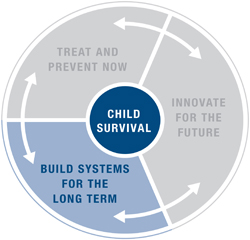
Strengthen human resource and health system capacity.
The long-term sustainability of child health programs requires investments in areas such health work force, supply chain and logistics, and information for effective decision making. Examples of philanthropic opportunities include supporting delivery systems for vaccines or fortification for micronutrients such as folic acid and iodine.
Mobile devices and decision assistance may help overcome geographic barriers to get timely data from the community level to improve the quality of care, priority setting, and performance. Creative partnerships of universities, governments, non-profits, and the private sector can together tackle the crisis issue of training and retaining all levels of health workers in the developing world particularly in sub-Saharan Africa.
3. Innovate for the Future
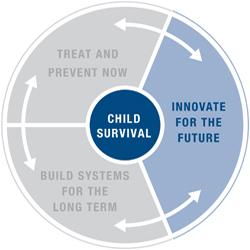
Support innovation for new tools and delivery platforms to reach neglected communities.
New discoveries are critical to improve our current tools, develop solutions in neglected areas, and to stay ahead of evolving drug resistance. In addition, new delivery strategies that can reach the rural poor and urban slum dwellers need to be piloted and examined. For example, promising models include those that use microcredit lending groups to reach women and their children with health services or franchised private sector health clinics.


